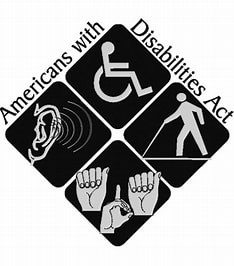Below is a review of the posts (on Facebook, LinkedIn, and X [formerly Twitter]) from the past week. You can check out the full posts by clicking on the links.

The post on Sunday 11/5/2023 noted that failure to inform employer of disability dooms ADA claims. A federal appellate court held that termination of an employee due to conflicts between court-ordered substance abuse classes and his work schedules did not violate the ADA.
The employee worked for a natural gas plant; he drank excessively when off duty and often passed out. After his third DUI citation, he was ordered to attend a three-month substance abuse course as part of his probation. The employee met with his supervisor and manager to explain what he had to do as a result of the DUI – including the job-related things noted in the post. His manager helped some, but it wasn’t enough (see the post). The employee was fired. Not surprisingly, he sued for intentional discrimination under the ADA, failure to accommodate and retaliation. The federal district (trial) court held that the employee’s alcoholism was not a disability under the ADA and granted summary judgment to the employer on all claims. The employee appealed.
The appellate court reversed the trial court’s determination that the employee’s alcoholism was not a disability under the ADA. The basis upon which it reversed is in the post – and all employers should take note of it. The appeals court also held that the employee had provided ample evidence that his alcohol-induced inebriation caused significant impairments (with examples in the post). As to the claim of intentional discrimination, the appellate court held that the employer had produced a legitimate, nondiscriminatory reason for termination (as noted in the post) and how the employer had tried to accommodate (again, see the post).
The employee tried to show that the employer’s reason for termination was a pretext for discrimination, but the court dismissed the claim (with its finding discussed in the post). The appellate court then turned to the employee’s failure-to-accommodate claim. The basis on which the court again affirmed the trial court is in the post – and makes sense given the legal requirements of the ADA. The appellate court then examined whether the accommodation requested by the employee was reasonable. Its analysis and conclusion are in the post
TAKEAWAY: per EEOC guidance, the ADA may protect an employee with alcoholism if they ae eligible under the statute. If an employee with alcoholism requests an accommodation, employers must begin the interactive process to determine if a reasonable accommodation is available that will not cause undue hardship to the employer. An employee’s failure to request accommodation for a hidden disability will probably doom any subsequent claim by the employee. Get help from an employment lawyer.

The post on Monday 11/6/2023 asked: Are your company’s return to work policies ADA compliant? Recently the EEOC announced that Public Service Company of New Mexico (PSCNM) and PNMR Services Co. agreed to pay $750,000 (and more) to settle a case alleging violations of the ADA.
The EEOC alleged that PNM had a policy or practice of failing to accommodate qualified employees with disabilities. The specifics are in the post. The EEOC argued that employers cannot condition an employee’s return to work on the ability to work without restrictions; rather under the ADA, when an employee is returning from a medical leave, employers should confirm the return to work date remind the employee that if accommodations are needed they must inform the employer so the interactive process can follow.
The EEOC also had another allegation relative to violation of the ADA. It is in the post. What the employer should do in that situation is also in the post (and tracks the ADA).
TAKEAWAY: employers should review their return-from-leave policies and practices to ensure they are ADA compliant. Employees should remember that courts routinely hold that requests for indefinite leaves of absence are not reasonable under the ADA, such that termination might be appropriate.

The post on Tuesday 11/7/2023 told us a title loan company to pay $60,000 to settle EEOC racial harassment and disability suit. Community Loans of America, Inc. and its subsidiary, Carolina Title Loans, Inc., agreed to the payment and statewide equitable and injunctive relief. The EEOC alleged in its complaint that from approximately August 2019 through September 2019, a branch manager subjected an African American employee to a hostile work environment based on race. What the manager (allegedly) did is in the post. The employee reported to managers and a company hotline, but no action was taken. And then there was the action taken by the employer related to the employee’s disability which resulted in her termination– see the post. The suit was brought under Title VII after conciliation failed. The non-monetary relief is almost as important as the dollars – see the post for what the employer has agreed to do.
TAKEAWAY: Employers should prevent (or eliminate) racially hostile conduct in the workplace and provide reasonable accommodations to employees with disabilities if there is no undue hardship. Legal assistance is also a good idea

The post on Wednesday 11/8/2023 noted homeowner fights back: wins battle with HOA over ‘four windows’ $12K fine. The post is interesting, written from one of the window’s point of view, one of the 4 that got Sherri Loeffler in trouble. Most of the homes in the community had 8 windows, but Loeffler had 4. The initial plan she submitted was rejected by the HOA, but they later approved it. But then when neighbors started to whisper and criticize, the HOA urged her to match the 8 windows in other homes. Loeffler tried to work it out. What she offered is noted in the post. Then came the fines – $100 per day. The total as of now is in the post (and has 5 numbers to the left of the decimal!). Then the stakes escalated – legal documents hinting at a foreclosure arrived. Loeffler then sued the HOA – and won! The fines were removed, there was no lien, and more as noted in the post. But that was not the end, oh no. The HOA Board planned to appeal. What the Board said is in the post.
TAKEAWAY: When living in a planned community (condominium, cooperative, or HOA), one must comply with the various restrictions and rules – and the Board must evenly enforce those same things.

In the post on Thursday 11/9/2023 we read that residents upset after treasurer admits stealing $153K from HOA. Yep, this author would be upset too. This post is actually a VID about what happened in a 55+ community. An internal audit, however, shoed that the amount taken might be more than $250K. The thefts apparently started in 2015. How the HOA plans to proceed is in the post/VID. QUESTION: how did this not get noticed sooner?
TAKEAWAY: make sure there are internal controls in your Homeowners’ or condo association. Checks and balances where money is involved. Consult a community association lawyer for assistance.

The post on Friday 11/10/2023 revealed hospital not liable to unvaccinated med student. NOTE this post is both in writing and can be listened to. Here a federal court judge decided that a medical student’s rights under the First Amendment and Title VII were not violated when he was denied access to a hospital because he refused to be vaccinated against COVID-19. So what happened? Jared Pierce Sanchez was a medical student at Brown University. Brown gave him an exemption from vaccination based on his religious beliefs. However, at that time the COVID-19 vaccination policy required anyone with access to the Hospital to be vaccinated and did not recognize any exemptions. Sanchez filed a complaint for discrimination based on his religion. The counts in the complaint are noted in the post. It appears the matter was easy for the court to decide; the basis of its Title VII ruling is in the post (and serves as a good reminder to al). The court also analyzed the First Amendment claim – and found no valid claim. Its analysis is also in the post.
TAKEAWAY: As an initial threshold, know what laws apply to your legal situation.

Finally, in the post yesterday 11/11/2023, we saw that the EEOC accuses trucking company of violating employee’s religious rights. The EEOC’s suit was filed against Wheeler Trucking on behalf of Charles Lynch III who is of Middle Eastern descent and belongs to the Torah Observant Christianity religion. So what happened?
The EEOC alleges that after Lynch told company managers he couldn’t work on Saturdays because of his religious beliefs, managers made comments to him (see the post) and fired him. The lawsuit alleges that Wheeler violated Lynch’s civil rights. The relief sought by the EEOC in the suit is listed in the post and is both monetary and non-monetary.
Lynch had worked for the company from 2016 through January 2021. The suit alleges that during that time, he endured harassment by co-workers and supervisors who called him racial slurs, including those noted in the post (which are cringe-worthy). But the weren’t done with that; they also mocked his religious beliefs and more as noted in the post, all as impacting the suit. In January 2021, his schedule changed to force him to work on Saturdays. Wheeler ignored his requests and forced him to work. The response he got from managers after more complaints is in the post.
TAKEAWAY: Employers must accommodate employees’ sincerely-held religious beliefs unless they can prove hardship (which has gotten harder due to the recent US Supreme Court ruling in this area). Talk to your employment lawyer to stay legal.

 York, Pennsylvania 17403
York, Pennsylvania 17403